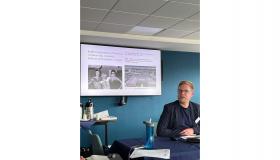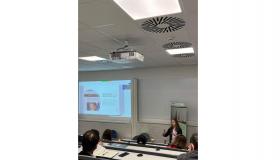Gendering IR Working Group sponsors Critical Perspectives on NATO workshop
On 25-26 May 2023, Newcastle University hosted a workshop on Critical Perspectives on NATO organised by Sorana Jude and Katharine A.M. Wright. Along with the British Academy and Military War Security Research Group at Newcastle, the BISA Gendering International Relations Working Group (GIRWG) sponsored the event.
GIRWG are a group of scholar-educators who engage in researching how 'gender makes the world go round'. In order to do this, we reach beyond traditional IR to a wide variety of disciplines including sociology, politics, women's gender studies, masculinity studies, queer theory, cultural studies and development studies, while still maintaining our grounding in IR and global politics. Our members often work in policy-related areas such as human rights, maternity legislation in Europe, and links between UN peacekeepers and the spread of HIV/AIDS.

Across the workshop programme there was a strong emphasis on the use of feminist perspectives to understand NATO critically. Such gender sensitive approaches become all the more salient against the backdrop of the Russia-Ukraine war with its gendered impact and NATO's new Strategic Concept adopted last year which commits to Women, Peace and Security and acknowledges gender equality as a NATO value. The workshop drew across disciplines from IR to political geography, the arts and beyond.
Although there is extensive academic interest in NATO, with some arguing that there is a body of scholarship on "NATO studies" (Weber and Sperling, forthcoming), critical perspectives remain on the margins. The aim of the workshop was therefore to bring together scholars and practitioners interested in unpacking the seeming contradiction between ‘hard’ and ‘soft’ security within the workings of the Alliance. In this context, we aimed to focus on a range of critical perspectives (e.g. but not limited to feminist, queer, and decolonial) to address a number of related issues (e.g. climate change, Women, Peace and Security, feminist foreign policy, hybrid threats, digital diplomacy, nuclear proliferation, war preparation etc.) while simultaneously paying close attention to the Alliance’s relations with others across the globe (e.g. Japan, New Zealand and Ukraine). By exploring perspectives on NATO from within and beyond the Alliance, we also aimed to examine perceptions of civil society on the Alliance (including anti-NATO activism), to interrogate NATO’s visual and spatial politics, to examine its relations with China and Russia, and to assess its partnerships with other International Organisations (e.g. the UN or EU).

Over two days, 25 scholars and practitioners discussed issues ranging from cultural property protection and Women, Peace and Security, to perceptions of Enhanced Forward Presence (EFP) battlegroups, all aimed at unpacking the meanings of military security and defense within NATO across a variety of case studies.
We had papers on the expectations of Finland as a member, to the narration of NATO under Ceauşescu in Romania and the island militarisation of Gotland, Bornholm and Åland. Regardless of their interest, all delegates examined NATO’s development as a collective security actor, reflected on its role in international politics, and assessed its (self-)understanding as a defense alliance, thus drawing attention to its challenges and priorities as an international actor.
Along with reflections on the practitioner/academic relationship, engagements between peace activists and NATO bases and novel methods for understanding space security, the workshop proved to be an excellent avenue for expanding our engagement with NATO and rethinking avenues for research impact.

An excellent and thought provoking keynote lecture from Maria Mälksoo (University of Copenhagen): NATO’s New Front: Allied Deterrence Goes East, put the workshop in broader context. While examining NATO’s EFP in Poland and the Baltic states, the keynote explored the post-Cold War evolution of the Alliance while carefully unpacking the political and performative role of its deterrence policy, especially given the impact of the Russian intervention in Ukraine. In light of these geopolitical changes, the keynote assessed NATO’s identity and practices in a changed security environment.
The importance of the workshop topics and its relevance to NATO’s current trajectory mean this is just the beginning of the conversation, with the aim of producing a future publication to disseminate the insights of the papers more widely. Anyone interested in hearing more about the workshop should contact Sorana and Katharine. To find out more about GIRWG, contact Annika and Laura.